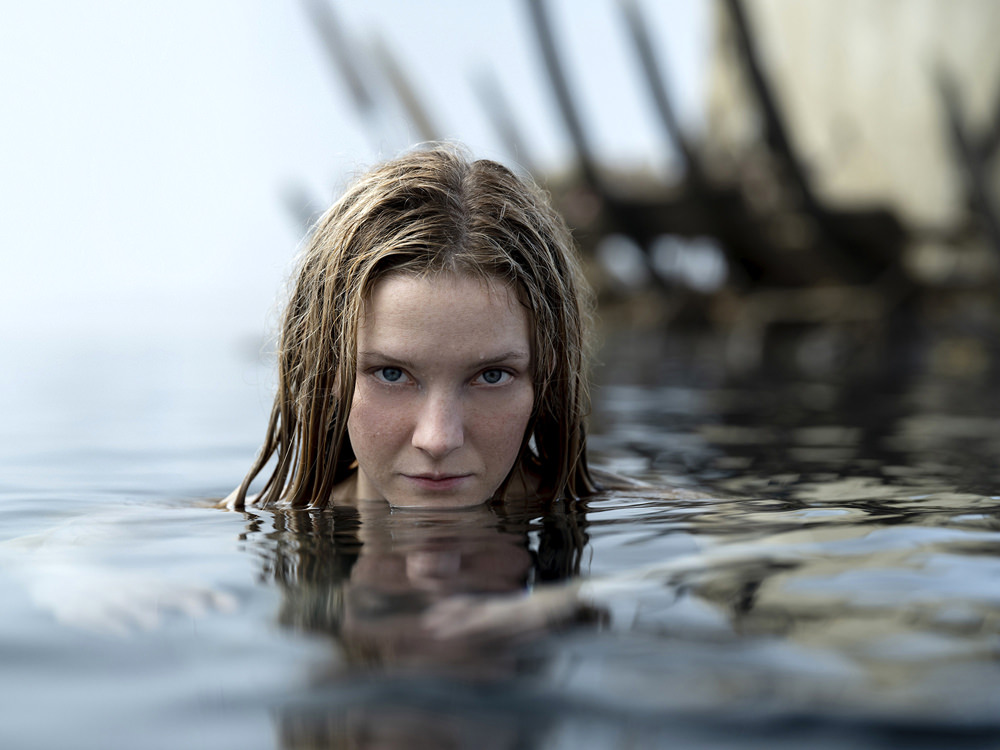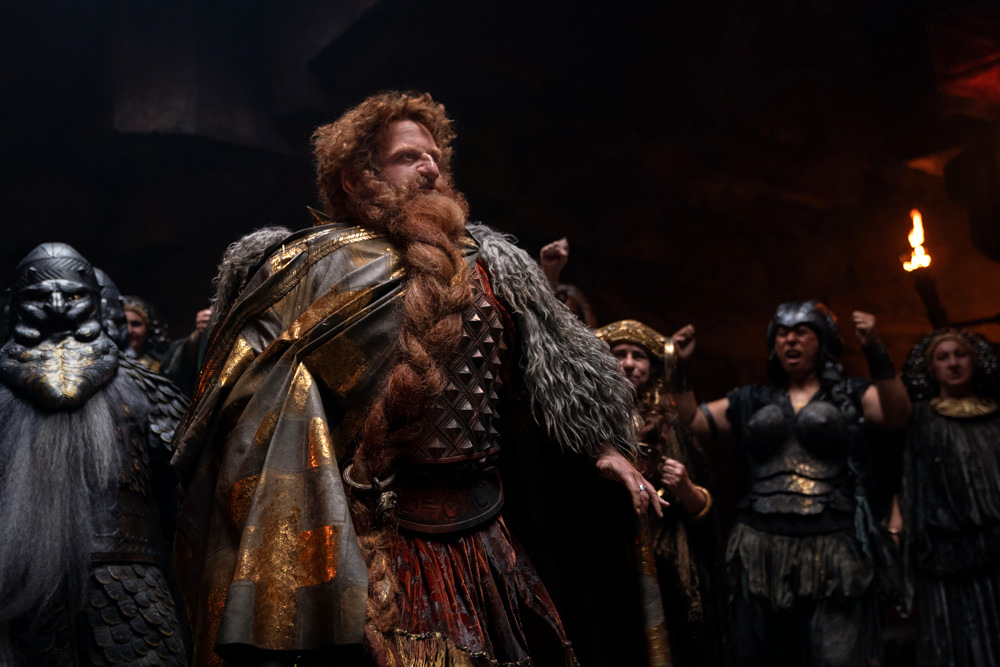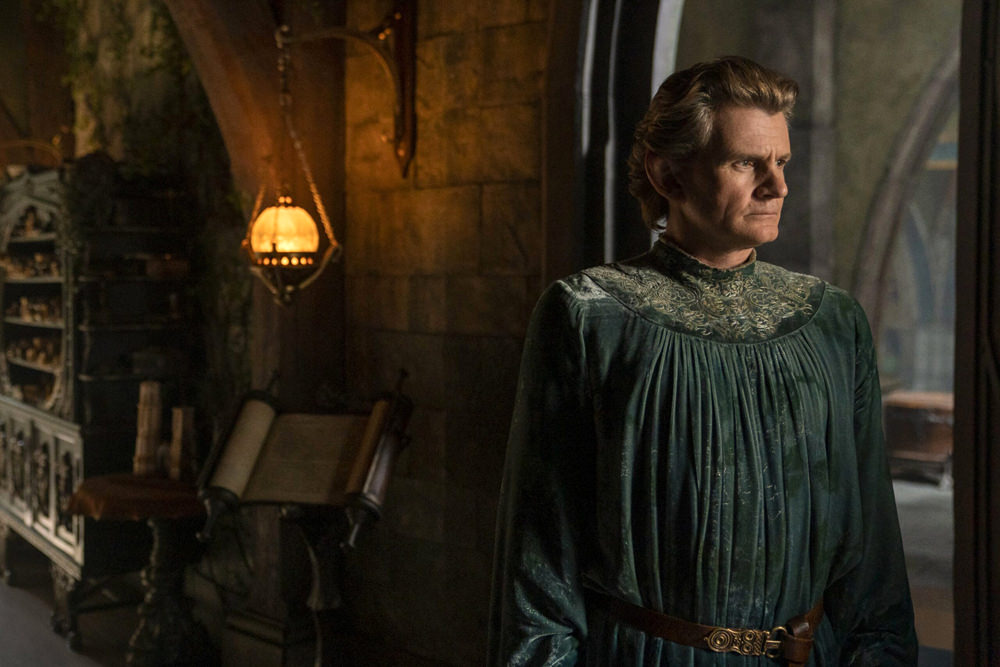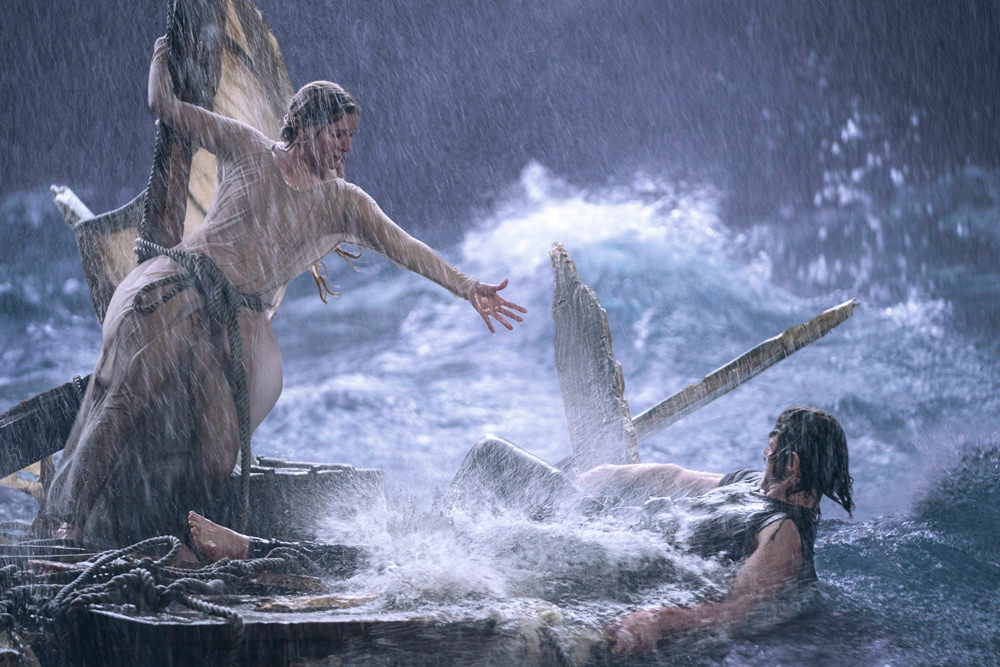
In episode two of The Rings of Power, things get even more complicated and some major callbacks to the original material start to manifest, some of which may be red herrings. Let’s stroll through the map, shall we? In Rhovanion, Nori and Poppy approach the giant bearded naked man who fell from the sky. He grabs Nori’s hand and roars, displaying some form of primal power that he can’t seem to control before passing out again. Poppy tries to convince Nori to leave him alone, but she refuses, claiming that he needs their help, although we think it’s more likely that curiosity is driving Nori’s actions far more than empathy. As they struggle to transfer him to a safer spot, they debate what exactly he is, since a human falling from the sky would get killed and according to Poppy, he’s not pretty enough to be an elf. “He’s something else!” Poppy cries with alarm. There’s a semi-obvious implication being made here, but we’ll put a pin in that for a second. Nori admits that she thinks there’s something important about the being that only she can understand; that she was destined to find and help him. In a so-called “normal” story, we’d say that she was trying to convince herself or that she was suffering from a delusion, but if this is being true to Tolkien’s world as he envisioned it, then premonitions like Nori’s should be taken as literally as possible. She tells Poppy she can’t ever walk away from him until she knows he’s safe.
The eastern village in the Southlands is in flaming ruins as Arondir and Bronwyn investigate. Ominously, there are no bodies, survivors or wounded. Something not human has dug passageways under the entire village. Arondir tells Bronwyn to go and warn her people while he follows the passageway, presumably in search of the missing villagers.
In Eregion, the glorious city of Elvensmiths, Elrond looks upon Fëanor’s hammer and muses on the making of the Silmarils with Celebrimbor, who notes that all true creation requires sacrifice. He tells Elrond of his plans to bring beauty to the world, beyond “petty works of jewelcraft,” which is a hell of a way to refer to the Silmarils. He wants Elrond’s aid in building a tower, which will contain a forge that will burn “as hot as a dragon’s tongue.” He promises Elrond that the things they could use it to create could transform Middle Earth, in the kind of dialogue for which prequels tend to be known. Not that we’re complaining. If anything, the show is doing a fairly good job of underlining the foreshadowing so that even casual viewers can tell that something of significance is being discussed, without making it seem like they’re pointing big neon arrows at the important bits. Celebrimbor needs the tower built by spring, for some reason, and Elrond notes they’d need a world-class work force to even attempt to meet such a deadline. Elrond asks Celebrimbor if he’d consider a work force from “outside the confines of our own race” and takes him on a relatively short walk to Khazad-dûm, later known also as Moria, or the place where Gandalf loudly informed a Balrog that it shall not pass. But that is many thousands of years away and the Khazad-dûm of this age is a paradise of wonders instead of a massive, crumbling tomb. But first the two elves have to gain entrance, which proves to be difficult until Elrond invokes a challenge. He is taken away while telling Celebrimbor to trust him.

As Elrond is taken to see Prince Durin, we get an extended look at a fully functioning Khazad-dûm at the height of its glory and regardless of whatever else The Rings of Power may or may not accomplish; whether it truly pays homage and respect to Tolkien’s vision or not, there is just something inherently thrilling about getting to see a Khazad-dûm when it was green and glittering and full of hardworking Dwarves in a thriving community. The design of the Dwarves here differs slightly from previous versions. They don’t sport the oversized hands and feet that characterized everyone from Gimli to Thorin in the six Jackson films and the effect is a little more realistic and less cartoonish. Elrond greets his old friend Durin upon seeing him, but the Dwarf ignores him and announces that the visiting Elf has invoked the Dwarven test of endurance, fashioned by Aulë, the creator of the Dwarves himself. If the Elf wins, he is granted a single boon but if he loses, he will be banished from the halls forever. The test couldn’t be simpler or more Dwarven: they just keep busting big rocks until one of them can’t.
In the daylight, Nori goes back to check upon her meteor man, who she finds wrapped in a gray(!!) blanket while scratching runes and muttering to himself. He has long, wild gray(!!) hair, blue eyes, and a beard. She startles him and he lets out a deep roar that causes all of the trees to sway and a shadow to pass over them. She gets him to calm down and introduces herself using sign language, interestingly enough. It makes sense that a culture that survives by hiding has a non-verbal language, after all. She teaches the giant wild-haired man how to eat and asks him about himself. He scratches lines and symbols into the dirt frantically and mutters words to her, but Nori doesn’t understand him. We’ll note that the closed captioning shows him to be saying the words “Mana” and “Urë,” which are a bit above our pay grade in terms of deciphering Tolkien. Meanwhile – and we’re not sure if or why there seems to be a connection – we keep cutting back to the Harfoot encampment, where Nori’s father is helping to erect some sort of canopy and ultimately winds up breaking his ankle. When Nori returns, he assures her he’s fine, but it’s clearly a bad break. Sadoc asks if he’s able to migrate, which implies how serious something like this can be for the nomadic tribe.
Meanwhile, Galadriel just keeps swimming. She comes upon a makeshift raft of human shipwreck survivors, who argue about whether to trust her and rescue her. The pull her aboard and start peppering with questions, although it’s clear that they’re all pretty traumatized. When one of them reveals her ears, they all turn on her – again, noting how this adaptation has made racial enmity a major theme driving a lot of the action. We wonder if the perpetually aggrieved are going to wind up calling this too woke. Ha ha, just kidding. Of course they will. Anyway, the aforementioned wyrm starts its attack on the raft and the first thing the humans do is to push the Elf into the water. The shot of Galadriel swimming away as the wyrm attacks the raft behind her is spectacular work. She comes upon the surviving member of the raft, who cut himself free from them in order to get away. His name is Halbrand (Charlie Vickers) and he was evidently hand-delivered from the casting department with a label attached that says “Rogue.” He’s wearing some sort of mysterious pendant. It’s giving “Sea Aragorn” and she is not impressed by it. He tells her that his home was destroyed by orcs, which gets her to soften toward him considerably. She asks him about the pendant around his neck and if it has something to do with his people’s king, which is more on-the-nose than we expected this conversation to go. He tells her he has no king, she counters that she can help him reclaim his kingdom, and he scoffs. She rather arrogantly announces that she chose to deny glory in order to fight the very enemy that destroyed his home, but he tells her to stay out of his business. She counters that she’s been doing this so long that to even recount the names of the people she’s lost would take the longer than his lifespan, which is a pretty damn killer line. We’re starting to think these two, you know, like-like each other. He tells her that he comes from the Southlands, which means he’s either from the village Bronwyn and Arondir came upon, or he’s from some neighboring and equally unfortunate settlement.

Back at the Dwarf Olympics, Durin and Elrond are keeping pace in their rock-busting until Elrond eventually concedes. We think it’s likely that he could have gone much longer breaking rocks, but he opted to throw the match so he could have some alone time with Durin while being escorted out. When Elrond tries to speak with him, Durin attacks him, genuinely hurt, because his friend hasn’t checked on him in twenty years, having missed his wedding and the birth of his children. This is an interesting way to explore friendships between beings with extremely different lifespans, since Elrond wouldn’t have considered two decades to be much time at all. Elrond manages to get himself invited to dinner anyway, which suggests that he was a consummate politician even then. We meet Durin’s wife Princess Disa (Sophia Nomvete), who is overjoyed to meet the fabled Elrond and effortlessly dismissive of just about anything her husband says that she doesn’t want to hear. Once again, The Rings of Power partially makes the case for its own existence by depicting things that haven’t really been depicted or explored onscreen, like the home lives of Dwarves, not to mention Dwarf women and children. Princess Disa’s character design is gorgeous and the their living quarters looked spectacular on screen. Those Dwarves really know how to make an impressive set of dining chairs.
Bronwyn tries to warn her fellow villagers about the danger coming their way, but in typical Middle Earth fashion, they all scoff at her or ignore her. It’s amazing how these people live in a world swarming with evil and danger while constantly denying that it even exists. Back home, Theo thinks he hears mice under the floorboards and he attacks them in fury with a fire iron, which doesn’t strike us as a particularly healthy or normal reaction to mice in a rural setting. Anyway, it’s not a mouse. In the passageways under the neighboring village, Arondir is stalked by something scary enough to make the Elf flee by squeezing through a narrow crack and swimming through an underground cavern. This is one of the things we love about Tolkien, which in turn inspired Dungeons & Dragons and countless quest-based video games: the way a character can turn a corner or squeeze through a crack or swim threw a pool and find a whole other hidden space, over and over again, like that’s the most natural thing in the world. He doesn’t get much time to muse on this fact, however, as a bunch of scary hands reach out from the darkness and grab him. Meanwhile, Bronwyn arrives to a house that’s been ransacked. The following scene, where she and Theo hid in different cupboards while an Orc stalks them like a Jurassic Park dinosaur was spectacularly terrifying and impressively creative in how it reimagines orcs, normally depicted as roiling masses of attackers in large battles or ambushes, into a single, terrifying monster stalking a family at home. This is followed by an equally as impressive and entertaining fight scene as Bronwyn and Theo attempt to subdue and kill the orc. At first we thought their triumph seemed unlikely until we remembered how many orcs Merry, Sam and Pippin managed to take out. Bronwyn slaps the head of the orc down on the bar and announces to the slack-jawed villagers that they need to come with her to the Elf tower if they want to live or it’s hasta la vista, baby.

Galadriel and Halbrand hit a massive storm in this, the absolute worst shipwreck survival ever depicted. Galadriel gets thrown overboard and sinks immediately because she was trying to get Halbrand to bind himself to her (we don’t quite get that part) and he risks his life to rescue her.
Back in Rhovanion, Nori is upset that she wasn’t there when her father was injured and goes go to visit the meteor man with Poppy to tell him that she can’t help him anymore. He notices their lanterns, which are filled with fireflies, and he causes them to break open to let the insects free. He whispers to them and they fly overhead to form constellations. Nori thinks he needs to find those stars and says she knows where to look, which we take to mean Sadoc and his books. Poppy notices all of the fireflies start dying and the meteor man starts crying. This is all very dark and weird, but let’s go ahead and talk about exactly what’s being implied here. Gray haired, bearded dude in a gray cloak whose voice can cause shadows and who can speak to insects? Played by actor Daniel Weyman, who doesn’t look entirely unlike a younger Ian McKellen? They’re clearly trying to make you believe that this is Gandalf. The most beloved wizard in all of fiction is a being known as a Maiar, which is a sort of heavenly or angelic figure, some of whom were sent to Middle Earth in the form of Istari, or wizards. However, according to Tolkien, Gandalf didn’t do this until thousands of years after this story is set, which would make this a fairly big diversion from the canon to which the show’s creators claim to be bound. There are other Maiar to choose from who manifested during this time, some of which are wide open for interpretation, like the Blue Wizards. On the other hand, we feel like setting up the audience to believe that Gandalf has arrived only to reveal it’s some guy they never heard of may backfire on them. You have to admit, if nothing else, it neatly explains why Gandalf loves halflings so much. They practically midwifed him into the world if this story is saying what it appears to be saying.
King Durin meets with his son Prince Durin to discuss his distrust of Elrond and all his kind. Prince Durin assures his father that Elrond is not only trustworthy, but not a threat to whatever it is they have planned. “We’re the ones holding the long end of the hammer here.” They open a small chest that glows inside, which suggests some sort of prequel-itis take on the Arkenstone, we guess. This could also be a fakeout like the Gandalf thing, so we’ll have to see. Speaking of prequel-itis, Theo’s sword hilt starts flaring up in flames and growing, which seems pretty alarming, especially since he hides all of this from his mother, who is leaving along with the rest of the village for the Elf tower. Meanwhile, Galadriel and Halbrand appear to be rescued by a passing ship. While the spectacle and high quality of the production remain high and extremely entertaining for the most part, it’s still possible that the story could get bogged down with trying to do too many things at once. The thing about Tolkien, which is nearly impossible to apply to a television series, is that he constructed his stories so that he could take a really long time focusing on one aspect of the larger tale at a time, to the exclusion of all others. We wonder if it wouldn’t be a good idea for the show to take a bit of a breather at some point, now that so many plot lines have been set in motion.
[Photo Credit: Amazon Studios]
THE LORD OF THE RINGS: THE RINGS OF POWER, Ep. 1 “Shadow of the Past” Next Post:
Venice Film Festival 2022: Cate Blanchett in Schiaparelli at the TÁR Premiere
Please review our Community Guidelines before posting a comment. Thank you!



